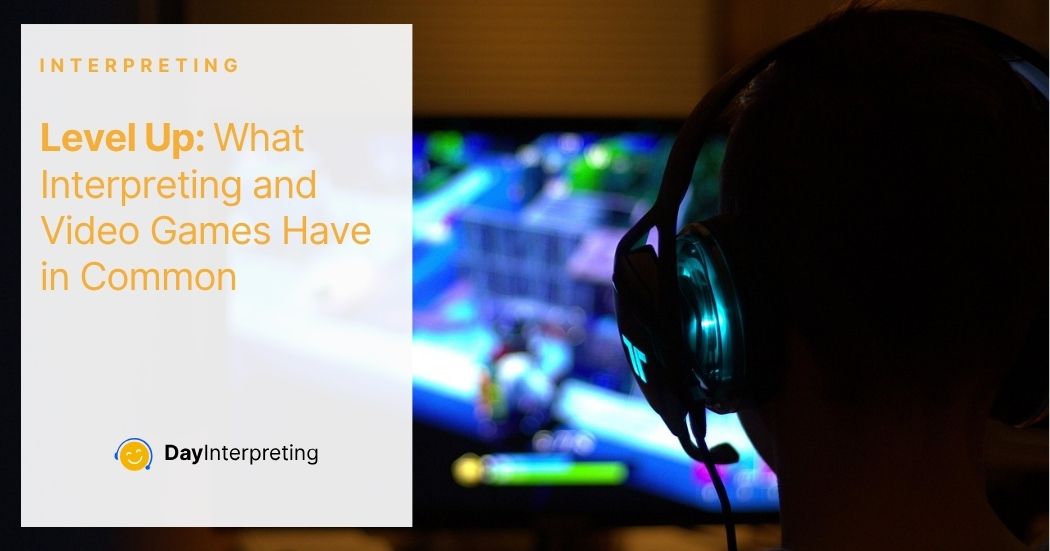Think interpreting is all suits, courtrooms, and conference booths? Think again. The skills interpreters use every day—rapid thinking, cultural sensitivity, and multitasking— are exactly what gamers use when they’re dodging virtual bullets or unlocking puzzles in different worlds. The world of interpreting and video games have a surprising amount in common. As games become increasingly international, interpreters are quietly becoming an integral part of the gaming ecosystem.
The Multilingual World of Gaming
Gaming is no longer just a pastime for one country or one language group. It’s a global phenomenon. Games like Fortnite, League of Legends, and Final Fantasy have players from every continent teaming up, trash-talking, and trading strategies—in a dozen different languages at once.
And guess who steps in when players, developers, or streamers need to cross those language barriers?
That’s right: interpreters.
Real-Time Interpreting and Video Games
Professional eSports tournaments are no joke. They come with prize money, international sponsors, and a worldwide audience. So, when a South Korean player wins a global StarCraft tournament in California, the press wants an interview, right? An interpreter’s there, on the spot, making sure every “GG” (good game) and in-joke gets across.
A Few Gaming Moments That Needed Interpreting:
- Live Twitch interviews with pro gamers in multiple languages
- Gaming expos and launches (like E3 or Gamescom) with international speakers
- Developer Q&A panels with multilingual audiences
- Cross-regional eSports team meetings
Interpreters in Game Development
Before a game even reaches players, there’s a team of translators and interpreters behind the scenes helping game studios:
- Navigate international contracts
- Translate feedback from international testers
- Conduct developer interviews and workshops across countries
- Interpret at production meetings between teams based in Japan, Europe, and the US
This isn’t just business—it’s creative collaboration across languages.
Gaming as Interpreter Training?
It might sound wild, but video games are actually great cognitive workouts for interpreters:
- Fast-paced decision-making? Every game ever.
- Split attention? Try listening to voice chat while watching for in-game cues.
- Multitasking under pressure? Welcome to interpreting 101.
- Understanding cultural nuance? Many games are packed with mythologies, idioms, and traditions unique to different regions.
Language and Lingo: Gamer Slang Is Its Own Dialect
If you’ve ever heard someone say “nerf the NPC or I’ll rage quit,” and thought, “Come again?”—you’re not alone. Gamers have their own vocabulary, full of acronyms and shorthand.
Interpreters who work in the gaming world have to learn:
- Common gamer slang (GG, OP, AFK, meta)
- Regional versions of gamer slang (Korean eSports terms differ from Brazilian Twitch speak)
- Tone and delivery — Is it sarcastic? Literal? Inside joke?
The Rise of Gaming Interpreters
As gaming continues to explode worldwide, more opportunities are emerging for interpreters:
- In-game live interpretation for virtual worlds (yes, really—interpreters can facilitate in-world meetings!)
- Interpreting during multilingual Twitch streams
- Helping indie developers break into new markets
- Moderating multilingual Discord communities
Gaming may not be a traditional interpreting setting, but it’s becoming a hot one.
Conclusion: Interpreters Have Entered the Chat
Gaming isn’t just play—it’s a serious, multilingual business with global reach. And interpreters? They’re becoming essential players, helping ensure that no matter what language a gamer speaks, the experience stays fun, fair, and fully understood.
So the next time you see a live-streamed tournament or a behind-the-scenes developer session, remember: someone’s working behind the scenes, keeping the language flowing as smoothly as the game mechanics.
Achievement unlocked: Global communication.





0 Comments